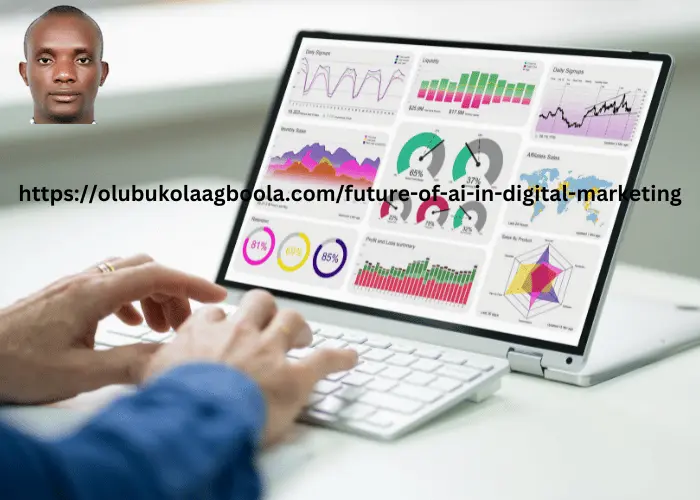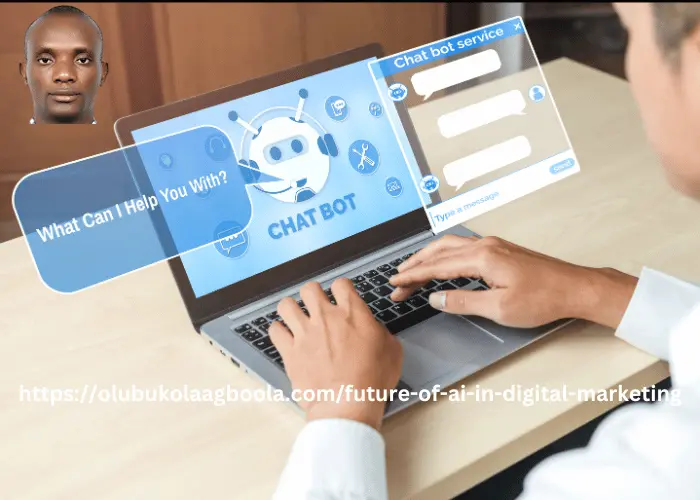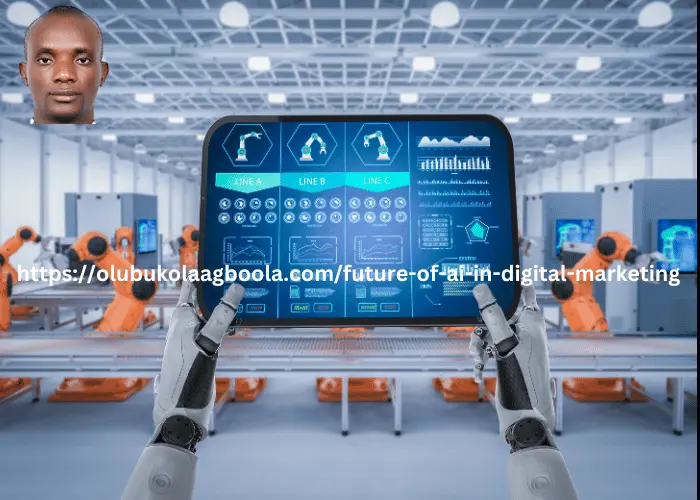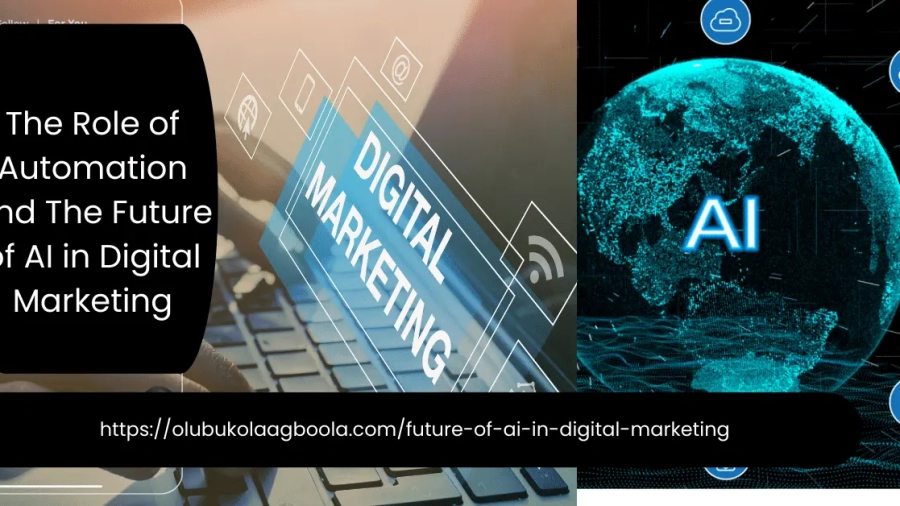It is no longer news that artificial intelligence has impacted practically every aspect of human life, including business.
The use of artificial intelligence has significantly improved digital marketing, particularly when it comes to automation.
Companies and brands that take too long to adjust to some of these developments not only sabotage their own efforts but also position themselves for future irrelevance in the future of AI in Digital Marketing.
Knowing how AI will affect the digital marketing industry can help you use it for competitive advantage.
In light of this, a study on how automation and AI are likely to alter the future of digital marketing has been conducted. Two popular questions asked by AI enthusiasts are: How is Artificial Intelligence reshaping the future of digital marketing? and What is Artificial Intelligence in Digital Marketing?
Due to the availability and adoption of improved marketing decisions and strategies, there is a close relationship between digital marketing and AI.
The advantages of AI and automation in digital marketing will now be discussed.
Table of Contents
- AI and automation advantages for digital marketing
- Future of AI In Digital Marketing and the Role of Automation
- Amazon’s Recommended Products page
- AI and automation’s drawbacks and limitations in digital marketing
- Conclusion – Future of AI in Digital Marketing
AI and automation advantages for digital marketing
1. Better personalization and customer targeting
Businesses can examine consumer data and behaviour trends with the use of AI and automation in digital marketing to develop targeted marketing campaigns and provide individualized customer experiences.
Businesses may increase conversion rates and boost customer satisfaction by using AI algorithms to optimize their marketing campaigns so that the right customers receive the right message at the right time.
2. Improved Client Retention and Engagement
Businesses can interact with customers in real time through chatbots, social media, and other digital channels with the use of AI and automation.
This enables companies to offer customised suggestions based on customers’ tastes and behaviour and swiftly reply to customer inquiries.
Businesses may strengthen their ties with consumers by enhancing the customer experience, which will enhance brand loyalty and customer retention rates.
3. Enhanced Productivity and Efficiency
Lead nurturing, email marketing, and social media management are just a few repetitive operations that automation may help firms optimize, freeing up staff to concentrate on more strategic projects.
Businesses may decrease human error, conserve time and resources, and boost the general effectiveness and productivity of their marketing initiatives by automating these procedures.
4. More insightful data analysis
Businesses can gather and analyze enormous volumes of customer data with the aid of AI and automation, giving them important insights into consumer behaviour, preferences, and trends.
Then, with the use of this data, marketing tactics can be improved, targeting and personalisation can be made more effective, and marketing campaigns can be optimized.
Businesses may use data-driven insights to make better decisions and remain ahead of the competition by utilizing AI and automation.
Future of AI In Digital Marketing and the Role of Automation
Watch me speak extensively on the role of automation and the future of AI in Digital Marketing on my YouTube channel below.
Following are some immediate ways that automation will have an impact on the future of AI in marketing.
Social Media Administration
Social media management is expected to improve and become simpler with artificial intelligence. AI can now manage routine duties like posting, reacting to consumer conversations and questions, etc.
Whereas marketers can use the extra time to take care of other marketing requirements. Moreover, AI can infer from demographics to determine client preferences and requirements, and as a result, can effectively reply to them on social media.
Advertising
Digital marketers will be more informed about analytical trends and will be able to develop better marketing plans thanks to the accessibility of analytical data made available by AI-enabled products.
More accurate data can be provided with the aid of machine language, improving target marketing.
Voice Search Enhancement
Voice searches and user involvement have grown in popularity in a variety of settings.
The demand for voice search-related content for digital marketing has increased along with the popularity of voice searches. By optimizing this feature, marketing professionals will have to up their visibility game.
Communications with consumers
The development of chat boxes has allowed for direct communication between AI and users.
This will enable rapid answers to queries. Data gathering will be permitted during interactions, and the collected information can be utilized to enhance personalisation in digital marketing.
By identifying consumers who are likely to lead and then following through with reaching out to them based on the analysis of their activities, lead generation AI may automate the lead creation process.
Analytics

As data are collected and analyzed by AI to predict customer wants in the future and provide information on the best marketing methods, precise predictions of future events can be made. Marketing in future impact of data analytics and artificial intelligence
Content Personalization
Data sourcing for personalisation has become simpler with the ability for direct one-on-one engagement between customers and AI.
Customers can be provided with personalized content to enhance their experiences and further marketing.
AI can automatically gather the content the audience needs, create a content outline, schedule posts, answer user inquiries, and more.
By offering content ideas based on data and trends, AI may improve the entire process of content creation.
Read Also: 7 Effective AI Content Detectors for GPT-3 and ChatGPT
Encounters with virtual reality
AI-powered reality experiences can improve customer experiences. It is important to look for creative ways to use virtual reality to promote marketing.
The “how-tos” of a product can be shared through virtual reality experiences to walk clients through its usage or configuration, for example. Virtual reality can also be used to deliver demos to customers.
Intelligent Email Marketing – AI Empowered
AI can analyze data to deliver the best email marketing techniques, including the use of personalized, effective opening lines and other creative ways to promote email marketing in order to get the necessary input to improve marketing.
An Improved Search Engine Optimization Strategy
AI can analyze the appropriate and pertinent terms to utilize to improve the content’s search engine optimization.
With the study of client data, AI can be used to drive online traffic for organizations.
Examples of AI and automation in digital marketing case studies
Amazon’s Recommended Products page
One excellent illustration of how AI is applied to digital marketing is Amazon’s recommendation engine.
To provide users with tailored product recommendations, the system uses machine learning algorithms to examine past purchases, browsing behaviour, and other data sources.
The platform’s sales have increased significantly thanks to this approach, which makes it possible for customers to find things they might not otherwise have known about.
Bots for conversational AI and chat

In recent years, conversational AI and chatbots have grown in popularity in digital marketing.
In order to comprehend and respond to client questions and comments, these systems use natural language processing.
They can be employed to resolve issues, offer help to clients, and even close deals.
Chatbots have been effectively deployed by businesses like Sephora and H&M to improve the customer experience.
Automated Advertising

Advertising that is purchased and placed automatically through the use of machine learning algorithms is known as programmatic advertising.
This enables advertisers to target particular audiences and real-time adjust their ad placements.
Several marketers now prefer programmatic advertising since it can help them save time and money while increasing their Returns.
Machine learning and predictive analytics
In digital marketing, predictive analytics and machine learning are used to evaluate data and forecast future consumer behaviour.
These techniques can aid marketers in better understanding their target market, campaign optimization, and even purchase likelihood prediction. For instance, Netflix makes movie and TV show recommendations to its subscribers based on their viewing tastes and history.
AI and automation’s drawbacks and limitations in digital marketing
Requirement for Relevant and Accurate Data for the Future of AI in digital marketing
The demand for precise and pertinent data is one of the main issues facing AI and automation in digital marketing.
As a result, inadequate, skewed, or irrelevant data might result in false insights and unsuccessful marketing initiatives. AI and automation systems significantly rely on data to operate and make judgments.
In order for AI and automation to produce useful results, it is imperative to guarantee data quality and integrity.
dependence on technology too much Another difficulty is the propensity to rely too heavily on technology and the belief that automation and AI can handle all marketing-related issues.
These tools can assist enhance efficiency and expediting marketing procedures, but they cannot take the place of human creativity, intuition, and empathy.
To make sure that marketing initiatives are in line with organizational objectives and appeal to the target audience, human input and supervision are still required.
Ethics-Related Issues
Digital marketing applications of AI and automation also present ethical issues related to algorithmic bias, data security, and privacy.
Marketers need to be careful about how they gather, use, and preserve customer data and make sure that their procedures adhere to moral and legal requirements for a safer future of AI in Digital Marketing.
They must also watch out for algorithmic prejudice, which can support systemic discrimination and tarnish the reputation of automation and AI systems.
Effect on Employment and Workforce
And last, the workforce and jobs may be significantly impacted by AI and automation in digital marketing.
While these tools can increase production and efficiency, they also have the potential to replace human workers and alter the nature of work.
Marketers need to take into account the possible social and economic repercussions of integrating AI and automation and take action to lessen any negative effects on workers and society at large.
Is AI going to replace Digital Marketers?
Watch Jason talk about a very important concern of digital agencies. Is AI going to replace digital marketers?
Conclusion – Future of AI in Digital Marketing
Artificial intelligence in digital marketing has the ability to change how companies interact with their customers and spur growth.
Because of the rapidly advancing technology tools and the abundance of data, marketers stand to gain a lot by utilizing AI to obtain insights, customize customer experiences, and improve campaigns.
Digital marketers must, however, be creative and flexible in order to adjust to these developments, employing AI to enhance their current marketing approaches and accomplish their objectives. Businesses may gain an advantage in the dynamic world of digital marketing by utilizing AI’s capabilities and staying ahead of the curve. This will ensure they benefit from the role of automation and the future of AI in Digital Marketing
Also, Read Other Articles Apart From The Role of Automation and the Future of AI in Digital Marketing:
- How to Use ChatGPT by OpenAI
- Make Money Writing Articles For Websites – How To Get Paid?
- How to Make Money on TikTok by Watching Videos
- Does Domain Age Affect SEO and Google Rank?
If you are looking to learn more from a PDF? Download how artificial intelligence will change the future of marketing pdf
Watch Jason talk about a very important concern of digital agencies. Is AI going to replace digital marketers?

